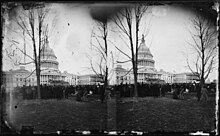Forty-third United States Congress
| 43rd United States Congress | |
|---|---|
|
42nd ←
→ 44th
|
|

United States Capitol (1869)
|
|
| March 4, 1873 – March 4, 1875 | |
| Senate President | Henry Wilson (R) |
| Senate Pres. pro tem |
Matthew H. Carpenter (R) Henry B. Anthony (R) |
| House Speaker | James G. Blaine (R) |
| Members | 74 Senators 292 Representatives 10 Non-voting members |
| Senate Majority | Republican |
| House Majority | Republican |
| Sessions | |
|
Special: March 4, 1873 – March 26, 1873 1st: December 1, 1873 – June 23, 1874 2nd: December 7, 1874 – March 4, 1875 |
|
The Forty-third United States Congress was a meeting of the legislative branch of the United States federal government, consisting of the United States Senate and the United States House of Representatives. It met in Washington, D.C. from March 4, 1873 to March 4, 1875, during the fifth and sixth years of Ulysses Grant's presidency . The apportionment of seats in the House of Representatives was based on the Ninth Census of the United States in 1870. Both chambers had a Republican majority.
The count below identifies party affiliations at the beginning of the first session of this Congress, and includes members from vacancies and newly admitted states, when they were first seated. Changes resulting from subsequent replacements are shown below in the "Changes in membership" section.
Before this Congress, the 1870 United States Census and resulting reapportionment changed the size of the House to 292 members.
This list is arranged by chamber, then by state. Senators are listed in order of seniority, and Representatives are listed by district.
Senators were elected by the state legislatures every two years, with one-third beginning new six-year terms with each Congress. Preceding the names in the list below are Senate class numbers, which indicate the cycle of their election. In this Congress, Class 1 meant their term ended with this Congress, requiring reelection in 1874; Class 2 meant their term began in the last Congress, requiring reelection in 1876; and Class 3 meant their term began in this Congress, requiring reelection in 1878.
The names of members of the House of Representatives are preceded by their district numbers.
(6-2 Republican)
(4 Republicans)
(3-1 Republican)
(3-1 Republican)
(1 Republican)
Both representatives were elected statewide on a general ticket.
(2 Republicans)
...
Wikipedia
